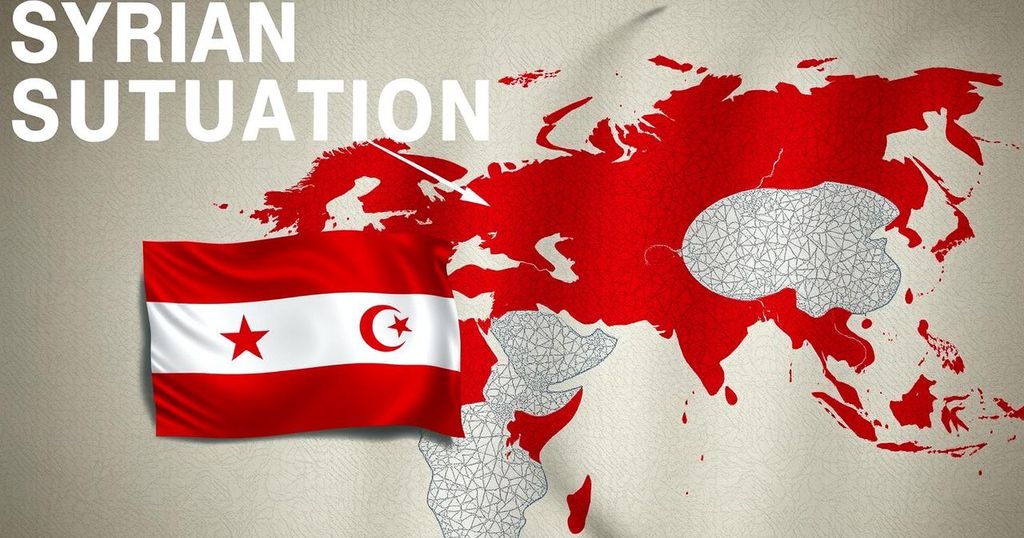Understanding the Complex Dynamics of the Syrian Conflict

The Syrian conflict, originating from the Arab Spring, transformed from peaceful protests into armed rebellion due to brutal crackdowns by the Assad regime. Disenfranchised Sunni Muslims saw this struggle as a fight for freedom, identity, and rights. The intervention of Iran, Hezbollah, and Russia complicated the scenario, while Turkey sought to shape the outcome in favor of Sunni rebels. Ultimately, the conflict remains a tragic interplay of local aspirations and geopolitical maneuvers amidst enduring hope for justice.
The Syrian conflict, ignited by the Arab Spring and decades of oppression under the Assad regime, saw the initial peaceful protests metamorphose into armed resistance as severe crackdowns led to a significant escalation in violence. The Sunni majority, disenfranchised and suppressed, viewed their struggle both as a quest for political freedom and a reclamation of their suppressed religious and social rights. The involvement of Iran and Hezbollah deepened sectarian divisions and further alienated Sunni populations, while international interventions from Russia and Western powers seemed to quash the voice of the Sunni majority and intensified the humanitarian crisis.
Turkey emerged as a critical player in support of the Sunni rebels, aiming to foster regional stability and protect its national interests amidst fears of Kurdish autonomy. Its military backing helped maintain a rebel stronghold in Idlib, even as the Assad regime, buoyed by Iranian and Russian support, continued to wage a brutal campaign against dissenters. Thus, the struggle for Syria became not only a fight for democracy and freedom but a broader battle for identity and survival in a fragmented landscape marked by internal and external pressures.
Despite the unrelenting suffering, there persists hope among the Syrian people for a just future built on Islamic principles, reaffirming their resilience amidst despair and devastation. The conflict ultimately underscores the tragic intersection of local aspirations and geopolitical maneuvering, leaving deep scars with a long road to recovery ahead.
The Syrian conflict began in 2011, following the wave of protests known as the Arab Spring, fueled by widespread discontent with decades of autocratic rule under President Bashar al-Assad. The Assad regime’s brutal suppression of initial peaceful protests sparked an armed rebellion, primarily among the Sunni Muslim majority, against a regime dominated by Alawite and Shia interests. As the situation escalated into a complex civil war, outside interventions from various global powers exacerbated the conflict, leading to massive humanitarian crises and reshaping the geopolitical landscape of the region. The involvement of Iranian militias and Hezbollah not only shifted the dynamics of the conflict but also intensified sectarian tensions, complicating the fight for freedom and justice for many Syrian Muslims. Conversely, Turkey’s engagement was motivated by regional security concerns, aiming to prevent the spread of Kurdish autonomy while supporting the Sunni factions in their struggle against the Assad regime. In this instability marked by violence and displacement, the aspirations of the Syrian populace for peace and justice remain starkly confronted with the realities of authoritarianism and external influence.
The Syrian conflict represents a tragic confluence of local struggles for freedom, identity, and justice ensnared within a web of international geopolitical interests. The unwavering resilience of the Syrian people, despite severe oppression and humanitarian tragedies, highlights a continuing quest for dignity and rights. Turkey’s involvement, aimed at bolstering Sunni rebels and asserting regional influence, provides some measure of hope, yet the persistence of the Assad regime and external pressures complicates the landscape for achieving lasting peace and justice. As the crisis endures, the global community bears a responsibility to address these complex realities and work towards a just solution for the vale of the Syrian people.
Original Source: indiatomorrow.net








